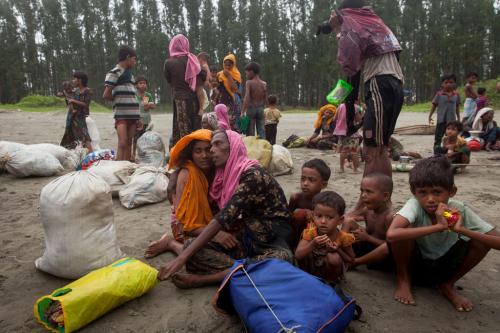In Bangladesh, UN refugee chief warns influx of Rohingya outpaces capacities to respond
The United Nations refugee chief called for ramped-up support for an estimated 436,000 Rohingya refugees who have fled to Bangladesh from Myanmar in the last month, warning that the massive influx of people seeking safety far outpaces capacities to respond on Sep 25.

Newly arrived Rohingya refugees sit at Shamlapur beach in Cox's Bazar district, Bangladesh, after traveling for five hours in a boat across the open waters of the Bay of Bengal.
“Their situation remains desperate, and we risk a dramatic deterioration if aid is not rapidly stepped up,” UN High Commissioner for Refugees Filippo Grandi said in a press release, following a visit the day before to Kutupalong refugee camp and other areas along the Bangladesh-Myanmar border where people have made their own shelters on tiny slivers of land.
“Despite every effort by those on the ground, the massive influx of people seeking safety rapidly outpaced capacities to respond, and the situation has still not stabilised. More is needed, and fast, if we are to avoid further deterioration,” Mr. Grandi said.
UNHCR has now airlifted three planes loaded with relief items into the country, and is distributing emergency shelter kits, kitchen sets and solar lamps.
Its experts are working closely with the Government of Bangladesh to set up an organised site with water, sanitation and other facilities, and to register the new arrivals. Other international agencies and civil society partners are also on the ground.
Mr. Grandi arrived in Bangladesh on Saturday to see conditions for himself. He spoke with families living in the camp near Cox’s Bazar.
“They had seen villages burned down, families shot or hacked to death, women and girls brutalized. Many of the refugees said they would like to go home, but there needs to be an end to violence, and a restoration of rights inside Myanmar,” Mr. Grandi said.
“Solutions to this crisis lie within Myanmar. But for now, our immediate focus has to be to dramatically increase support to those who are so desperately in need,” Mr. Grandi said, stressing the importance of a proper registration system that could help ensure everyone is eventually able to exercise the right to return.
In the country’s capital, Dhaka, Mr. Grandi was scheduled to meet several senior officials, including the foreign minister as well as the ministers for home affairs and disaster management and relief.
Mr. Grandi thanked Bangladesh for keeping the border open. “In today’s world, that is something that cannot be taken for granted and should be appreciated.”
Meanwhile, the UN Children’s Fund (UNICEF) said the day before that a consignment of its emergency supplies for hundreds of thousands of refugee Rohingya children and their families has arrived in Dhaka.
The cargo plane arrived from Copenhagen with 100 tons of supplies comprising water purifying tablets, family hygiene kits, sanitary materials, plastic tarpaulins, recreational kits for children and other items.
“Safe water for drinking and washing is absolutely essential in order to protect them against diarrhoea and other waterborne diseases,” said Edouard Beigbeder, UNICEF Representative in Bangladesh, warning that this is “a very real threat” especially amid the current heavy rains.
Other consignments – consisting of school bags, tents, early childhood development kits, family hygiene and dignity kits, tarpaulin and nutrition materials – were also on their way to Bangladesh.
Source:United Nations
- 219 reads
Human Rights
Ringing FOWPAL’s Peace Bell for the World:Nobel Peace Prize Laureates’ Visions and Actions

Protecting the World’s Cultural Diversity for a Sustainable Future

The Peace Bell Resonates at the 27th Eurasian Economic Summit

Declaration of World Day of the Power of Hope Endorsed by People in 158 Nations

Puppet Show I International Friendship Day 2020

